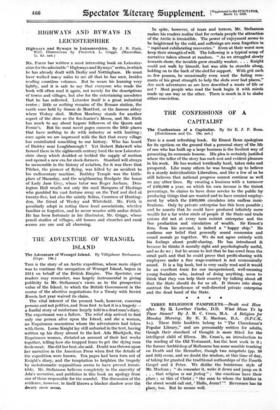THE CONFESSIONS OF A CAPITALIST
The Confessions of a Capitalist. By Sir E. J. P. Bonn. (Hutchinson and Co. 18s. net.) Tars is a most refreshing book. Sir Ernest Berm apologizes for its egotism on the ground that a personal story of the life of one who has built up a large business is the liveliest way of presenting its economic lessons. His plea is certainly justified where the teller of the story has such zest and evident pleasure in his work. He has worked terrifically hard, taken risks and prospered. Like many others he was brought up to believe in a sturdy individualistic Liberalism, and like a few of us he still believes that national progress cannot continue so well on any other lines. By creating a business with a turnover of £400,000 a year, on which his own income is the tiniest percentage, he claims to have done service to the public by producing things that are wanted and to have created employ- ment by which the £400,000 circulates into endless _rami- fications. Only by private enterprise has this been possible ; and he asserts that he could have produced infinitely more wealth for a far wider circle of people if the State' and trade unions did not at every turn restrict enterprise and the free production and circulation of wealth. Sir Ernest's firm, from his account, is indeed a " happy ship." He confirms our belief that generally sound economics and sound morals go together. We do not agree entirely with his feelings about. profit-sharing. He has introduced it because he thinks it morally right and psychologically useful, and so do we ; but he seems to feel that he has erred from the strait path and that he could prove that profit-sharing with employees under a free wage-contract is not economically sound. It is a big book, but is very easily read and it would be an excellent tonic for our inexperienced, well-meaning young Socialists who, instead of doing anything, seem to think that they can help their country by talking about alt that the State should do for us all. It throws into sharp contrast the beneficence of well-directed private enterprise and the dead hand of the State.






























































 Previous page
Previous page